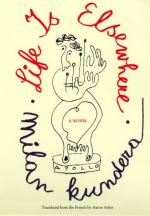
|
| Name: _________________________ | Period: ___________________ |
This test consists of 5 multiple choice questions, 5 short answer questions, and 10 short essay questions.
Multiple Choice Questions
1. At the beginning of Part 6, Chapter 1, what does Kundera do with the story?
(a) Makes Maman the main character of the story.
(b) Moves the point of observation to another character.
(c) Begins to intersperse his prose with lots of poetry.
(d) Dismisses Jaromil as an unimportant character.
2. What makes Maman think that Jaromil is actually becoming like a son of Apollo?
(a) He has begun writing beautiful poems, not poems of death.
(b) He values the Greek gods more than passing political trend.
(c) He has taken down the picture of his father.
(d) His face is becoming beautiful and godlike rather than coarse.
3. When does Jaromil feel that the girl belongs to him completely?
(a) When he writes a poem about her.
(b) When she lets him undress her.
(c) When she swears to love him forever.
(d) When his hands are around her neck.
4. According to Jaromil, how do socialism and love interact?
(a) Socialism allows for true love to exist.
(b) Socialism stifles love.
(c) Socialism comes from the root of love.
(d) They are complete opposites.
5. Why is there silence at the beginning of the question-and-answer time following the recitation?
(a) Everyone is respectfully waiting for the silver-haired poet to speak first.
(b) The poets are professional and know what the questions will be.
(c) No one cares about the poems enough to ask questions.
(d) No one knows how to begin.
Short Answer Questions
1. When Jaromil wants to recite poetry to the redhead, what disturbing thought occurs to him?
2. When does Jaromil's anger toward the girl at last subside?
3. How does the old poet describe the cinematographer and Jaromil?
4. What does Lermontov assert is the highest quality in life?
5. How long has it been since the middle-aged man saw the girl who rang his doorbell?
Short Essay Questions
1. How is the girl a different person from when she went into the prison? How is she more like Jaromil had been?
2. What arguments do Jaromil and the redhead have concerning their families? How does this illustrate Jaromil's juvenile mindset?
3. When the girl visits the middle-aged man, she is wearing winter clothes. What does this detail reveal about the timing in the story?
4. The group of poets, Jaromil among them, is invited to speak at the police academy in the countryside. What is the irony of this situation and what does it say about the ideals they espouse?
5. What happens when Jaromil recites his poems to the audience of police members? How does this compare to the hopes he has had?
6. Maman is disillusioned about the cinematography girl after the girl does not invite her to the party. How does this show the similarity between Maman and the girl?
7. After not sleeping with the cinematographer, Jaromil considers his underwear for a long time, in light of the women involved. What does he decide? How does this single piece of clothing drive so much of what he does?
8. What does the middle-aged man tell the girl about Jaromil? How is this story the opposite of what Jaromil ever wanted?
9. Jaromil's first revelation about duty is that it is "voluntary and represents human daring and dignity" (Part 5, Chapter 11, pg 263). Given his situation, is this true?
10. Near the end of the book, Xavier betrays Jaromil by leaving him behind. What is the significance of this scene?
|
This section contains 1,773 words (approx. 6 pages at 300 words per page) |

|




